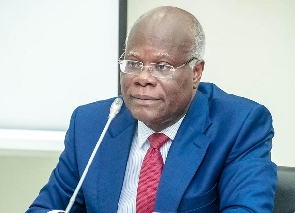Minister for Trade and Industry, Kobina Tahir Hammond, has said the Komenda Sugar Factory has become an “albatross” around the neck of the country.
According to him, apart from the factory not being properly set up, the company that originally undertook the construction of the factory has returned with a demand of US$7.5 million, though the previous government spent US$34.5 million on it.
“This Komeda sugar factory has been an albatross created by… (he pointed at the minority without saying a word),” KT Hammond said.
The minister said this in Parliament on Thursday, July 20, 2023, when he was answering questions on the subject, which stood in the name of the Member of Parliament for Bole/Bamboi, Yussif Sulemana.
Asked on his behalf by the MP for Tamale North, Alhassan Suhuyini, the main question was why the agreement with Park Agrotech Ghana Limited, the strategic investor for the factory, was abrogated.
The company was approved by Cabinet in June 2019 as the preferred strategic investor for Komenda Sugar Development Company Limited.
No contract
In his answer, the minister stated there was no agreement between the two to have been terminated from the word go.
He explained that there were some conditions precedent that the company could not meet, thereby, not being able to have a contract with the government.
“Mr. Speaker, there was a long delay in concluding the negotiations between the lawyers of Park Agrotech and the Transaction adviser PWC [Price Water House], in respect of the conditions precedent for the lease agreement, under the agreement between Park Agrotech and Komenda Sugar Development Company to come into force,” KT said.
He said COVID-19 further delayed the company from bringing its partners abroad to access the machine and do the necessary maintenance to restart production.
He added that the ministry, after painstakingly working with the Transaction Adviser on the various conditions precedent, issued a directive that August 31, 2021 would be the final deadline, which the investor could not meet.
According to him, the directive was that if no agreement had been reached at that point, “the transaction process was to be terminated. And the management of the company reverted to the board. By the close of business on August 31, 2021 no agreement had been reached between PWC and Park Agrotech and the transaction process was terminated.”
Pandora's box
The Minister, after the written answer, had a follow-up from the Bole MP, who, while KT was answering the main question, entered the Chamber.
He asked why the government mobilised the chiefs and introduced the company to “them that these were the people coming to start work,” if there was no agreement.
In his response, the minister said that considering the state of the company, “obviously” the chiefs and the people would be interested to know that the company was coming to work in the factory. He cautioned his colleagues on the other side against the move to blame the ruling government, saying that going on that tangent could only open the Pandora’s Box and “you will get extremely uncomfortable.”
In giving an answer to the follow-up question, the minister gave the history of the factory, saying the then NDC government in an attempt to show the world that the company was operational, “a lot of things were rushed through.”
He cited that “when eventually other engineers went there, it was realised that the structure of the plant was so bad [that] no manufacturing activity could take place.”
Cost incurred
The MP for Bole/Bamboi asked another follow-up question about whether the ruling government had incurred any costs with regards to overhauling, retooling and maintenance, which the minister mentioned, but the minister said he did not have any information about that.
“I do recall that the company that originally undertook the construction of the company has come back to ask for about US$7.5 million. So let me check if some more money has been expended. But I don’t have the information now,” he stated.
The MP then asked about the economic justification for importing semi-processed sugar to be processed by the Komenda sugar factory.
The minister in his response said the company does not import semi-processed sugar, adding that the company is to produce sugar from start to finish to deal with the importation of sugar.
“The company does not import any such material. The Komenda Sugar Manufacturing Company has undergone a comprehensive overhaul, retooling and maintenance to ensure that the factory will have full utilization of its production capacity, in respect of cane milling and refining of raw sugar to substitute imports,” he answered.
Watch the latest edition of BizTech and Biz Headlines below:
Business News of Saturday, 22 July 2023
Source: The Chronicle













